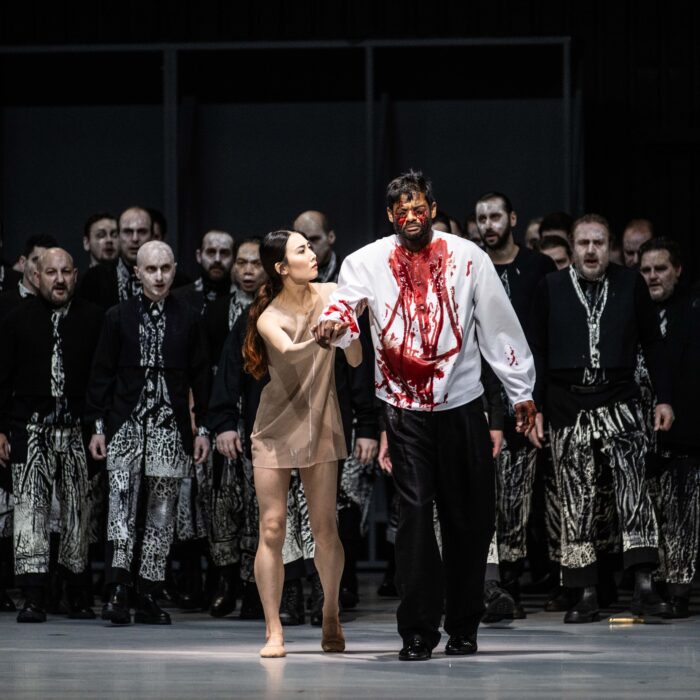
Pocket Opera 2019 Review: The Two Widows
Smetana’s Lively Work Delights In Fun Production
By Lois SilversteinPocket Opera’s “The Two Widows” was a treat. A Smetana rarity, Pocket Opera performed the work with gusto.
The opening performance at Berkeley’s historic Hillside Club provided an intimate setting for this charming production directed by Nicholas A Garcia, Pocket Opera’s current Artistic Director. Donald Pippin’s English version of the original Czech libretto by Emanuel Züngel, aptly enhanced the music.
The main roles were performed by four talented and dynamic singers. Karolina was interpreted by Lindsay Roush, while Anezka was performed by Jaime Korkos. As Ladislav audiences Justin Brunette, with Larry Venza as Grumpler. These leads were supplemented by an active and lively chorus with soloists and dancers.
Playing Off One Another
The two sopranos played off each other with ease. Lindsay Roush sang with wide and expansive tone, her voice soaring. Her ease of movement in what could be tight stage circumstances was deft as well as appealing; so too her gestures and facial expression. She was always present and lively, linking characters and ideas to each other with buoyancy. When she was onstage, the action never flagged. Her robust singing rang out energetically through the hall, though when it dominated, it became difficult to hear her precise diction and her singing partner’s as well.
Jaime Korkos sang with great attention to detail. Lyrical and lively, she sang with accessible feeling. In Act two, particularly in her solo and subsequent duet with Ladislav, she showed much depth and sensitivity. One charming bit occurred when she deliberately parodied Karolina for seeming to reverse her position on making a love match with Ladislav. This spoof on Karolina’s behavior gave us a chance to compare the two widows’ approach in sound as well as subject. It added a lively touch.
Ardent Lover & Comic Gem
Justin Brunette’s Huntsman easily became the ardent lover. He sang with lustrous round tones and much energy. In addition he moved with good flexibility around the stage, showering all he contacted with a radiant glow.
In Act one, he sang with too much volume, the variation of expression often submerged in the sheer weight and spread of his voice. By Act two, however, he adjusted the variety and subtlety and so became more convincing and moving. He played well with his stage sweetheart and, overall, gave an affable performance.
Larry Venza played Grumpler, the Warden keeping the comic elements free and sparkling. He zigged around the stage with ease and gaiety while singing with freshness and flair. Even as his voice faltered on the lowest notes, his welcome stage manner made up for it.
Lidka, sung by Nicole Lopez-Hagan, and Tonik, sung by Jackson Beaman, added several nice moments as they polka-ed around, their duets heightening the overall tone of flirtation and fun. Beaman’s occasional loss of high notes did not spoil the overall presentation. The two wove in and out the chorus like a bright ribbon weaving in and out of a cloth.
The two Choruses, Adult and Children’s, were energetic and lively overall, conveying good stage dancing and romancing.
The dancers also put on vivid and traditional folk dances by Mary-Kay Stuvland, who also did the colorful, beribboned costumes. The details were not only precise but pleasing. The dancers moved with good timing and joy in addition to amplifying the overall mood of merriment.
Even the small stage didn’t confine the sense of festival their colorful costumes conveyed. In fact, it accented the illusion that such an event was actually going on. The stage business of the young children coming on and off the stage to dip into the goodies of the upcoming feast added a nice touch.
Hiding the Goods
Music Director Frank Johnson, and his Pocket Philharmonic were neatly secreted behind screens decorated with an array of pastel flowers, and the ubiquitous bench and fence, provided by Daniel Yelen; they provided a consistent and lyrical display. Their music supported and highlighted the singers; being such a small orchestra, it sounded more thin in places than the lyrical Smetana might have wanted. So too, some scratchiness marred the robustness of melody and sheer song. It was, however, harmonious and lustrous.
“The Two Widows” amply illustrates the appealing melodies that made Smetana famous in his home country.
Smetana was known in the latter part of the 19thcentury as a strong representative of Czech national spirit. The libretto, another excellent translation by the redoubtable Donald Pippin, known for his excellent libretti, others including Mozart, Puccini, Donizetti, Rossini. Here both the local quality as well as a more general folk one came across as endearing and accessible. Local color in costuming amplified it.
I have often wondered why composers create comic opera when its concern with sometimes trivial and petty human concerns. Compared to the dark nights of the soul of “Otello” or “Parsifal,” which center so much on our more telling emotional quests, why should we pour so much effort into the other?
“The Two Widows” is one answer. Exposure of the limitations of human conventions and the sometimes silly actions we take as a consequence make for beguiling entertainment and satisfying theater. If Pocket Opera continues its Spring/Summer season with “Tales of Hoffman” and “La Rondine,” for example, with the same luster and” joie de vivre,” it will do precisely what it did for “The Two Widows”, entertain and satisfy.


